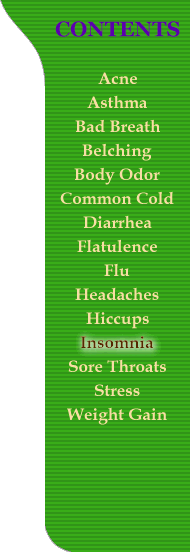|
Try a sleeping pill. You're not admitting defeat
by asking your doctor for a prescription sleeping pill or trying an over-the-counter
remedy. However, prescription pills should not be used for more than a
month at a time. They should also not be used for insomnia at high altitudes,
since that type of insomnia may be caused by trouble breathing and a lack
of oxygen. Taking sleeping pills at high altitudes may slow your breathing
rate even further and may be dangerous. Some doctors don't endorse over-the-counter
sleeping pills, however since they can cause side effects such as drying
out your mucous membranes and can make you drowsy the next day. Of course,
of you are pregnant, are nursing a baby, or have a serious medical problem,
you should consult your doctor before taking any drugs. Sleep medications
may also worsen snoring and sleep apnea, a dangerous condition in which
breathing is labored during sleep.
Never take sleeping pills throughout the night. If your do choose to take medication to help you fall asleep, make sure you only take your dose before you go to bed. If you take the medication when you wake in the middle of the night, it won't have a chance to wear off before morning and you're likely to end up being sleepy during the day. Get a comfortable bed. Sleep may also be disturbed because the individual is uncomfortable in his or her bed. In this case, the sleeper will probably be unaware of why ge or she was awakened. Soft beds are usually better for sleeping than firm ones are. Don't drink alcohol. Although alcohol can make you feel drowsy and may actually put you to sleep, it has the unpleasant side effect of waking you up later on in the night. After drinking alcohol, people often wake up in the middle of the night because of headaches, a full blader, or gastric upset. In addition, once alcohol's sedative effect wears off, there's a rebound effect that actually make the individual more likely to have trouble falling back to sleep. So skip the nightcap for a better night's sleep. Cut down on caffeine. We all know that too much coffee, tea or soda with caffeine can impede the ability to go to sleep at night. But how much is too much? A doctor recommends no more than two cups of coffee or othr caffeine-containing beverage in the morning and none after noon. Don't switch beds or move to the couch. It is important to associate your bed, and only your bed, with sleep. We are all creatures of habit. Regularity has to be enforced to facilitate sleep. Even animals tend to sleep in the same place every night. Try to maintain a normal schedule. Perhaps the most important rule for people with insomnia is to keep a strict sleep-wake schedule, even on weekends, sleep specialists agree. Many insomniacs become so desperate that they'll go to sleep any time that they can. If you can't sleep one night, simply get up at your usual time the next morning and don't take naps. Chances are, you'll be ready for a sound sleep by the next night. Confine work to the office. For the same reason that you shouldn't
switch beds or move to the couch every night, you shouldn't do work in
bed. It's important to associate your bed with sleep, not with unpleasant
things, like work. Relaxing activities like reading a novel or watching
television, are OK bedtime activities. It's also OK to have sex in bed.
|
 |